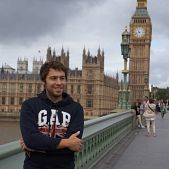
Exercise can be contagious according to new social network analysis by Greek researcher
A new analysis of the running habits of about 1.1 million people reveals that exercise is indeed contagious, though its communicability depends on who’s spreading it. This is the conclusion of the study in which a Greek researcher participates.
The findings, published in the journal Nature Communications, also reveal that certain relationships are better at spreading the running bug than others — and could have implications for the study of other social contagions, such as obesity and smoking.
In recent years, researchers in a wide range of fields — from economics and politics to medicine and computer science — have begun to investigate the ways in which many of our individual decisions affect the decisions of our peers, and how behavioral changes may spread through a social network.
“If behavioral contagions exist,” the study authors wrote, “understanding how, when and to what extent they manifest in different behaviors will enable us to transition from independent intervention strategies to more effective interdependent interventions that incorporate individuals’ social contexts into their treatments.”
Creating health and other interventions that effectively could harness the social network to maximize their benefit would be a real game-changer, researchers say. But it’s been difficult to draw conclusions from studies based on self-reporting surveys (where participants may not be fully honest or aware of their own behaviors) or laboratory experiments (which may not fully capture the real-life complexities of causal relationships within social networks).
So for this paper, Sinan Aral and Christos Nicolaides of the Massachusetts Institute of Technology used fitness tracker data to study the running and activity habits of around 1.1 million people in an actual global social network. The runners had formed about 3.4 million social network ties; the researchers analyzed the 2.1 million or so ties for which they could pinpoint geographic location and weather information for both users. Over five years, these social media users ran a collective 350 million kilometers (1 km equals 0.6 miles) — and their runs were all automatically posted online for their friends to see, reducing the issues that come with self-reporting.
On the same day on average, an additional kilometer run by friends influences an individual to run an additional 0.3 kilometers. An additional kilometer per minute run by friends pushes a person to run an additional 0.3 kilometers per minute faster than usual. If those friends run an extra 10 minutes, that person is likely to run about three minutes longer than they would have. If those friends burn an extra 10 calories, that person will end up burning 3.5 more calories.
The effect is strongest on the same day and appears to diminish with time, the authors wrote. So the scientists found that a runner’s peers did influence him or her to run more — but they also discovered that not all users influenced their buddies equally. Individuals were more likely to be prodded to up their game by less-active peers than by more active ones. Men were influenced by the activity of both men and women, but women were influenced only by other women. Inconsistent runners influenced consistent runners far more than the other way around.
“Social comparisons may provide an explanation for these results,” the study authors wrote. Social comparison theory, they added, “proposes that we self-evaluate by comparing ourselves to others.”
But do we make upward comparisons to peers performing better than us, or downward comparisons to those performing worse? That’s been a subject of debate, the researchers said.
“Comparisons to those ahead of us may motivate our own self-improvement, while comparisons to those behind us may create ‘competitive behavior to protect one’s superiority,’” they explained. “Our findings are consistent with both arguments, but the effects are much larger for downward comparisons than for upward comparisons.”
Christos Nicolaides is a physicist with strong interest in data science. He studies the interplay between structure and dynamics in complex systems with emphasis on contagion. He applies mathematical statistical and computational tools to large-scale empirical and data oriented research questions. Possible real world applications include agents and diseases spreading, the design of optimal mitigation strategies against outbreaks and the optimal diffusion of ideas through social networks. Currently, he is a James S. McDonnell Postdoctoral Fellow at the MIT Sloan School of Management. He works with Prof. Sinan Aral on detecting and quantifying causality in contagion of health related behaviors through social networks.










